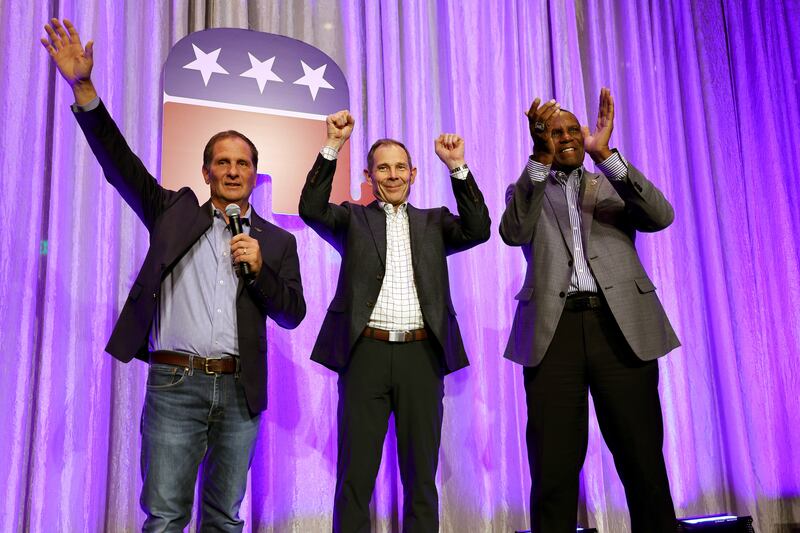Finally, the seemingly unending nightmare of the midterm elections is over and peace will reign (at least until tomorrow when the presidential campaign begins). Although some races have yet to be finalized, that is not stopping politicos, including your columnists, from opining on what we knew as of our Wednesday morning deadline.
The expected national red wave was barely a red ripple, although Republicans were on track to take control of the U.S. House and won big in Utah. What drove this momentum in Utah and were there any surprises nationally?
Pignanelli: “This was not much of a wave. There was unprecedented ticket splitting. Voters focused more on the candidates and not the general issues as expected.” — Gloria Borger, CNN
As the great Italian philosopher, Yogi Berra, once stated, “It’s déjà vu all over again.” The 2022 midterm elections are reminiscent of the 2016 presidential election in that the results varied dramatically from anticipations and predictions. But it also reflects the trends of six years ago that this country’s politics are fluid and evolving.
Generally, Utah GOP candidates avoided references to former President Donald Trump, allegations of election fraud and extremist positions. Therefore, they performed well especially in comparison to Republicans who chose another path in swing districts across the country. Thus, the strategy centered on bread-and-butter issues of economy, inflation and crime paid dividends.
The national scene was surprising because historical precedence and polling trends did not consistently materialize. So once again we are reminded that American politics is not a science but a mysterious combination of art and human emotion.
Webb: Utah Republican leaders won reelection and maintained control of the state because they are mainstream conservatives who solve problems, avoid partisan bickering and govern responsibly. They balance budgets and take care of the state’s needs. It’s a good formula for political success.
Nationally, Republicans underperformed quite dramatically, given inflation, the poor approval ratings of President Joe Biden, and concerns about crime and border chaos. One big loser is former President Trump, who helped a number of weak GOP candidates win nominations, only to narrowly lose to Democrats in the general election. Candidate quality counts, and many of the candidates boosted by Trump in high profile races couldn’t make the grade. Election denial is not a good campaign strategy.
A big winner was Florida Gov. Ron DeSantis, who led a GOP tsunami in his state and raised $209 million for his campaign. While he is an outspoken partisan, he also solves problems and gets things done. Another success story is Georgia Gov. Brian Kemp. Interestingly, neither DeSantis or Kemp are liked by Trump. The most successful Republican governors are not Trump disciples. But they’re the future of the party.
The GOP faces a real reckoning. Go with Trump and lose, or follow the examples of governors like DeSantis, Kemp and Utah’s Gov. Spencer Cox and win.
This election ended in stalemate. Neither side earned a mandate to do radical things. If ever there was a time to take mainstream, sensible steps forward at the federal level, it’s now.
Did Evan McMullin ever have a chance against Mike Lee? What do the results portend in future federal elections in Utah?
Pignanelli: Every Utahn with a television encountered the SuperPAC sponsored advertisement of former Gov. Jon Huntsman Jr. explaining his support of Lee. The always articulate Huntsman reminded voters of Lee’s famous convictions to constitutional principles, despite disagreements on style. McMullin’s name was never mentioned.
This commercial reflects the fundamental dynamics of the senate contest. Almost all voters knew Lee and his priorities. McMullin remained a mystery and even his most ardent supporters proclaimed his best asset was that he “was not Mike Lee.” A winning campaign cannot be built on such a lack of substance, especially when challenging an incumbent who is not the subject of any serious disputes other than a style some do not enjoy.
The race documented that spending millions of dollars without defining the candidate is pointless.
Webb: McMullin had a good theory. On paper, it looked reasonable. Lee has never enjoyed high approval ratings and Utah hasn’t embraced Trump to the degree Lee has. His actions after the 2020 presidential race raised a lot of eyebrows. So, If McMullin could unify Democrats, independents and moderate Republicans who don’t like Lee, he had a formula to win. But a majority of Utahns didn’t like him soliciting Democratic support and being embraced by them. That, combined with Utah voters’ desire for GOP control of the Senate, doomed McMullin.
What are the immediate effects of the midterm elections on Utah’s local offices?
Pignanelli: Several of Utah’s congressional delegation will likely hold important committee positions, which will help our state’s objectives. Furthermore, local officials will understand that the focus on economic and crime issues are what voters appreciate. Extremism was not a winning formula nationally or locally, proving again the “Utah Way.” Good governance remains our state’s winning formula.
Webb: It will be business as usual, which is actually good, because things are going well in Utah.
Republican LaVarr Webb is a former journalist and a semi-retired small farmer and political consultant. Email:lwebb@exoro.com. Frank Pignanelli is a Salt Lake attorney, lobbyist and political adviser who served as a Democrat in the Utah state Legislature. Email: frankp@xmission.com.


